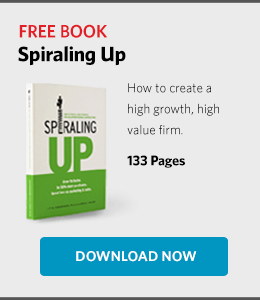If you’ve been in the consulting business even a short time, you’ve probably heard about someone who thought a sale was in the bag only to lose it at the last minute.
The story may sound familiar: The proposal was insightful, reflecting a true picture of the client’s situation, and the expected value of the project made the decision a no-brainer. Still, the project went to someone else.
You can have a stack of glowing testimonials, expansive qualifications, and an innovative approach and still lose a sale. The culprit might be a common piece of sales wisdom that can trip you up.
The More You Repeat, the Less They Hear
Just about every sales process (and sales presentation) is founded on this basic principle: You have to thoroughly understand the client’s issue and make the strongest case possible for hiring your firm.
That advice seems to make sense. Once you’ve shown that you really grasp the issue, you emphasize the factors your clients consider most important to their success.
You may even use the old-school presentation formula in your meetings, that is, tell them what you’re going to tell them, tell them, and then tell them what you told them.
But if the goal is to solidify your support and chip away at any resistance, too often the strategy of repetition and piling on the justifications for hiring you is at odds with  achieving your goal.
achieving your goal.
It’s true that your supporters want to hear why you’re the right choice. After all, that rationale reinforces their position–at least to a point. Take it too far, though, and don’t be surprised if you get tagged as too salesy.
If you overwhelm clients with the case for your qualifications, it’s natural for anyone, including your strongest advocates, to become dubious and start wondering if your proposal is too good to be true.
Plus, focusing on why you’re the best can actually harden naysayers’ perspectives, instead of helping them see the light. Why? Because you won’t change people’s minds by continually asserting your superiority.
If someone isn’t interested in hiring you, you’re wasting your time trying to convince the person that you’re the winning choice by slogging through another standard sales pitch.
If you want to open the minds of your detractors, you need to counter the natural bias most people have for seeking confirmation of their worldview. Before someone will see an existing thought in a new way, you must effectively challenge (and change) their way of thinking.
Why Not Us?
One simple way to challenge entrenched thinking is through the use of the counterintuitive. Engage your clients in a discussion that encourages them to see their views from a different angle.
For example, instead of reiterating “Why you should choose us” in your sales discussions, turn that around. Veer from the usual sales pitch and ask, “Why not us?” You will get people’s attention–and open their minds to another perspective.
For your critics, that discussion gets to the heart of their objections, validates their opinions, and shows them that you understand the good, the bad, and the ugly in your proposal. For many, that may be just what’s needed to spark a constructive dialogue that can eventually lead to a sale.
Sometimes, it only takes one counterintuitive suggestion to help someone see things in a new way.
That isn’t to suggest that you air your dirty laundry or sell for your competitors. In every client decision, there are trade-offs and risks. Most often, you design your presentations to put your best foot forward. Buyers expect that behavior and work to see past it.
Open a real conversation about the risks and trade-offs of hiring you, which isn’t typically expected, and your client will get a broader, more accurate view of your proposal and capabilities.
Asking “Why not us?” also helps your supporters to be better advocates. Most proposals have some weaknesses, and your clients probably know what those are. If you get out in front of those concerns, instead of trying to minimize them, your supporters will be better equipped to answer questions and concerns raised by others in the organization.
SEE ALSO: How the Geek Will Steal Your Clients
The Value of Transparency
Keep in mind that, even if you try to gloss over your shortcomings, clients will be trying to find and define those weaknesses in their own terms. You’re better off getting the issues out on the table so you have an adequate chance to address them before someone else decides that you’re not the right fit for the job.
The counterintuitive approach helps build the relationship with your client by demonstrating your openness and honesty. And you set the stage for a more successful project because there are fewer open questions to resolve once the sale is finalized.
I’m not suggesting that you throw away your best sales presentations and start off by telling clients all the reasons you’re not the right choice for them. You always need to make the case for your proposal.
But there are times when you need to do things differently if you want to win. Asking “Why not us?” is just one small example of how a counterintuitive angle can help push a sale ahead more effectively than repeating the mantra of your qualifications over and over.
Going counterintuitive isn’t always the best approach, but it can be a powerful differentiator in the right situation. Use your best judgment to decide when it’s called for. Why not try it?
On Twitter+ or LinkedIn? Follow us @HingeMarketing and join us on LinkedIn.


